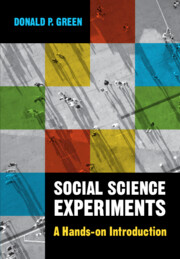92 results
Macropartisanship Revisited
-
- Journal:
- Perspectives on Politics , First View
- Published online by Cambridge University Press:
- 30 March 2023, pp. 1-10
-
- Article
- Export citation
The effects of proposal power on incumbents' vote share: updated results from a naturally occurring experiment
-
- Journal:
- Political Science Research and Methods / Volume 11 / Issue 2 / April 2023
- Published online by Cambridge University Press:
- 23 December 2022, pp. 437-446
-
- Article
-
- You have access
- Open access
- HTML
- Export citation
4 - A Tour of Social Science Experiments
-
- Book:
- Social Science Experiments
- Published online:
- 08 September 2022
- Print publication:
- 29 September 2022, pp 42-67
-
- Chapter
- Export citation
Copyright page
-
- Book:
- Social Science Experiments
- Published online:
- 08 September 2022
- Print publication:
- 29 September 2022, pp iv-iv
-
- Chapter
- Export citation
Solutions to Exercises
-
- Book:
- Social Science Experiments
- Published online:
- 08 September 2022
- Print publication:
- 29 September 2022, pp 110-139
-
- Chapter
- Export citation
5 - Research Ethics and Experiments Involving Human Subjects
-
- Book:
- Social Science Experiments
- Published online:
- 08 September 2022
- Print publication:
- 29 September 2022, pp 68-77
-
- Chapter
- Export citation
Index
-
- Book:
- Social Science Experiments
- Published online:
- 08 September 2022
- Print publication:
- 29 September 2022, pp 146-154
-
- Chapter
- Export citation
3 - Conducting a Practice Experiment (Not Involving Human Subjects)
-
- Book:
- Social Science Experiments
- Published online:
- 08 September 2022
- Print publication:
- 29 September 2022, pp 23-41
-
- Chapter
- Export citation
References
-
- Book:
- Social Science Experiments
- Published online:
- 08 September 2022
- Print publication:
- 29 September 2022, pp 140-145
-
- Chapter
- Export citation
2 - Key Terms
-
- Book:
- Social Science Experiments
- Published online:
- 08 September 2022
- Print publication:
- 29 September 2022, pp 6-22
-
- Chapter
- Export citation
7 - Doing More with Data
-
- Book:
- Social Science Experiments
- Published online:
- 08 September 2022
- Print publication:
- 29 September 2022, pp 93-109
-
- Chapter
- Export citation
Contents
-
- Book:
- Social Science Experiments
- Published online:
- 08 September 2022
- Print publication:
- 29 September 2022, pp v-vi
-
- Chapter
- Export citation
1 - Experiments as Fair Tests
-
- Book:
- Social Science Experiments
- Published online:
- 08 September 2022
- Print publication:
- 29 September 2022, pp 1-5
-
- Chapter
- Export citation
Preface
-
- Book:
- Social Science Experiments
- Published online:
- 08 September 2022
- Print publication:
- 29 September 2022, pp vii-viii
-
- Chapter
- Export citation
6 - Conducting Your Own Experiment Involving Human Subjects
-
- Book:
- Social Science Experiments
- Published online:
- 08 September 2022
- Print publication:
- 29 September 2022, pp 78-92
-
- Chapter
- Export citation

Social Science Experiments
- A Hands-on Introduction
-
- Published online:
- 08 September 2022
- Print publication:
- 29 September 2022
-
- Textbook
- Export citation
30 - Psychological Theories Meet the Challenge of Persuading and Mobilising Voters
- from Part III - Contemporary Challenges to Democracy
-
-
- Book:
- The Cambridge Handbook of Political Psychology
- Published online:
- 17 February 2022
- Print publication:
- 24 February 2022, pp 476-491
-
- Chapter
- Export citation
Part VII - Using Experiments to Study Government Actions
-
- Book:
- Advances in Experimental Political Science
- Published online:
- 08 March 2021
- Print publication:
- 01 April 2021, pp 507-508
-
- Chapter
- Export citation
Part II - Experimental Data
-
- Book:
- Advances in Experimental Political Science
- Published online:
- 08 March 2021
- Print publication:
- 01 April 2021, pp 147-148
-
- Chapter
- Export citation
Part III - Experimental Treatments and Measures
-
- Book:
- Advances in Experimental Political Science
- Published online:
- 08 March 2021
- Print publication:
- 01 April 2021, pp 217-218
-
- Chapter
- Export citation



